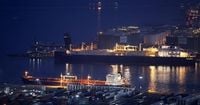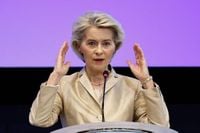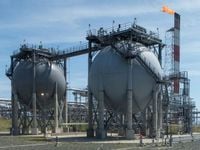The European Union is preparing to tighten the screws on Russia’s energy sector with a bold new package of sanctions, aiming to completely ban imports of Russian liquefied natural gas (LNG) and hit Moscow’s war machine where it hurts most: its wallet. On September 19, 2025, European Commission President Ursula von der Leyen unveiled the EU’s 19th round of sanctions against Russia, a move she says is necessary to push Moscow toward ending its ongoing war in Ukraine.
“It is time to turn off the tap,” von der Leyen declared in a video statement, urging all 27 EU member states to swiftly endorse the proposed measures. Her message was clear: “We want Russia to leave the battlefield and come to the negotiation table, and this is the way to give peace a real chance.” According to AP, the new sanctions package is not just another incremental step. Instead, it represents a significant escalation in Europe’s efforts to choke off the revenues that have allowed the Kremlin to sustain its military campaign without triggering domestic economic chaos.
The EU has already imposed 18 rounds of sanctions on Russia since the start of the conflict, targeting more than 2,500 entities. These include banks, ministries, energy companies, and top officials—among them President Vladimir Putin, his close associates, dozens of lawmakers, and several oligarchs. The most common measures have been travel bans and asset freezes, but the latest package aims to go much further.
Energy revenue is the linchpin of Russia’s economy. As von der Leyen put it, “Russia’s war economy is sustained by revenues from fossil fuels.” The EU, which has long been the largest buyer of Russian LNG, accounted for about 16% of its total LNG imports last year, according to The Guardian. Cutting off this revenue stream is seen as a crucial step to limiting Moscow’s ability to fund its military operations in Ukraine.
But the process is not without its challenges. Sanctions proposals must be approved by all 27 EU member states before they can take effect, and unity has often proved elusive. Hungary and Slovakia, for example, have consistently opposed phasing out Russian LNG, citing concerns over energy security and economic stability. As The Guardian notes, these countries—along with Belgium, France, Greece, the Netherlands, Portugal, and Spain—still purchase Russian gas through pipelines or LNG, making them pivotal players in the upcoming negotiations.
Despite these hurdles, EU foreign policy chief Kaja Kallas announced that the bloc aims to accelerate its phase-out of Russian LNG imports, moving the deadline up by a full year to January 1, 2027. “Our aim is to speed up the phase-out of Russian liquefied natural gas by 1 Jan 2027,” Kallas posted on social media, adding that “Moscow thinks it can keep its war going. We are making sure it pays the price for it.”
The new sanctions package is sweeping in scope. In addition to banning Russian LNG, the commission plans to add 118 vessels from Russia’s so-called “shadow fleet” of aging oil tankers to its sanctions list, bringing the total to more than 560. These ships are often used by Russia to bypass existing restrictions and continue selling oil abroad. “Major energy trading companies Rosneft and Gazprom Neft will now be on a full transaction ban, and other companies will also come under an asset freeze,” von der Leyen explained, according to AP and The Guardian.
But it doesn’t stop there. The new measures would also target refineries, oil traders, and petrochemical companies in third countries—including China—that continue to purchase Russian oil in violation of sanctions. The commission is proposing to close loopholes by imposing asset freezes on these entities and eliminating remaining exemptions from previous sanctions. There will also be a transaction ban on additional banks in Russia and third countries, as well as prohibitions on cryptocurrency transactions that could be used to evade sanctions.
Recognizing the evolving nature of modern warfare, the EU is also targeting the technological backbone of Russia’s military-industrial complex. The package includes direct export restrictions on items and technologies that can be used on the battlefield—particularly those related to drone warfare. Forty-five companies in Russia and elsewhere, accused of providing direct or indirect support to the Russian military, are set to be added to the sanctions list. “In a war driven by innovation, cutting off Russia’s access to key technologies is crucial above all when it comes to drones,” von der Leyen emphasized.
Kaja Kallas echoed these concerns, highlighting efforts to restrict Russia’s access to artificial intelligence (AI), geospatial data, and other critical resources that “feed weapons production.” She stressed that “depriving Moscow of the means to wage war is essential to end this war and protect the security of our continent.”
Beyond the battlefield, the EU is also moving to address the humanitarian crisis caused by Russia’s actions in Ukraine. Since 2022, Russia has faced international condemnation for the deportation of Ukrainian families, including many children. Kallas announced that the bloc would make it easier to sanction individuals involved in the abduction and indoctrination of Ukrainian children. “Tearing children from their families and deporting them to re-education camps is beyond description. We will not let Russia weaponize childhood itself,” Kallas posted on social media, as reported by AP and The Guardian.
While the EU’s measures have already had a significant impact—Russian oil revenues from Europe are reportedly down 90 percent since 2022—the road ahead remains fraught with political and economic challenges. The need for unanimous approval means that countries with deep energy ties to Russia can delay or block new sanctions, often using their leverage to extract concessions. As The Guardian points out, Hungary and Slovakia will be in the spotlight during the upcoming discussions, given their history of blocking or delaying proposed measures.
The EU’s push for tougher sanctions comes amid a broader international effort to isolate Russia economically and diplomatically. In a related move, the United Kingdom announced sanctions against two Georgian businessmen accused of supporting Russia’s war effort, as well as two tankers carrying Russian oil to Georgia. “Putin’s war machine relies on an international web to spread lies and fund this network,” UK Minister of State Stephen Doughty said, according to a statement from the UK foreign ministry. “We’re cutting off another lifeline by targeting and deterring those in Georgia who provide support for Putin’s illegal war in Ukraine.”
Meanwhile, pressure is mounting from across the Atlantic as well. U.S. President Donald Trump recently called on NATO nations to halt all purchases of Russian oil, arguing that continued imports “greatly weaken your negotiating position, and bargaining power, over Russia.” The EU’s new sanctions package, if adopted, would bring the bloc’s policies closer in line with these calls for a unified Western front against Moscow.
As the EU’s 27 members prepare to debate and vote on the proposed measures, the stakes could hardly be higher. The outcome will not only shape the future of Europe’s energy landscape but also determine the effectiveness of the West’s economic pressure campaign to bring about a just and lasting peace in Ukraine. For now, all eyes are on Brussels—and on the member states whose votes will decide whether the tap finally gets turned off for good.



